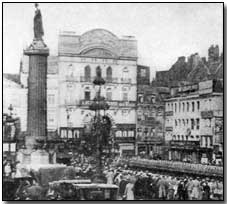Primary Documents - German Proclamation of Deportations from Lille, 22 April 1916
 Reproduced below is the
text of a proclamation issued by the German Military Governor of Lille,
General von Graevenitz, on 22 April 1916. In his proclamation von
Graevenitz announced that selected men and women living in Lille were to be
deported to surrounding areas for the purpose of working in the countryside.
This was, he stated, to provide provisions for civilian use.
Reproduced below is the
text of a proclamation issued by the German Military Governor of Lille,
General von Graevenitz, on 22 April 1916. In his proclamation von
Graevenitz announced that selected men and women living in Lille were to be
deported to surrounding areas for the purpose of working in the countryside.
This was, he stated, to provide provisions for civilian use.
Protests against the German policy - which had earlier been implemented in Belgium - quickly materialised. The U.S. Ambassador to Germany, James W. Gerard, complained to the German Chancellor Theobald von Bethman-Hollweg. The Spanish Ambassador similarly complained, as did the French Prime Minister, Aristide Briand, in an official statement.
Proclamation of 22 April 1916, by General von Graevenitz, German Military Commandant of Lille
The attitude of England makes the provisioning of the population more and more difficult.
In order to relieve the distress, the German Government has recently asked for volunteers to go to work in the country. This offer has not had the success anticipated.
Consequently, the inhabitants will be evacuated by order and removed to the country. The evacuated persons will be sent to the interior of the occupied French territory, far behind the front, where they will be employed in agriculture, and in no way on military works.
This measure will give them the opportunity of making better provision for their subsistence.
In case of necessity, it will be possible to obtain provisions from the German depots.
Each evacuated person will be allowed 30 kilograms of luggage (household utensils, clothes, etc.), which it would be well to prepare immediately.
I therefore order as follows: Pending further orders, no person shall change his residence. No person may be absent from his declared legal residence between the hours of 9 p.m. and 6 a.m. (German time) unless he is in possession of a permit.
Since this measure cannot be recalled, it is in the interest of the population itself to remain calm and obedient.
Notice Issued to Individuals With the Above
All the inhabitants of the house, with the exception of children under fourteen and their mothers, and of the aged, must prepare themselves to be transported within an hour and a half.
An officer will decide definitely what persons are to be taken to the concentration camps. For this purpose, all the inhabitants of the house must assemble in front of the house; in case of bad weather they may remain in the passage.
The door of the house must remain open. No protest will be listened to. No inhabitant of the house (even including those who aec not to be transported) may leave it before 8 a.m. (German time).
Each person will be entitled to 30 kilograms of luggage; if the weight is excessive, the whole of the luggage of the person concerned will be peremptorily refused. The packages must be packed separately for each person, and provided with an address legibly written and firmly affixed. The address must bear the surname, first name, and the number of the identity card.
It is absolutely necessary that each person should, in his own interest, provide himself with eating and drinking utensils, with a woollen blanket, with good shoes and with body linen. Every person must bring his identity card. Any person endeavouring to avoid transportation will be punished without mercy.
Photograph courtesy of Photos of the Great War website
Source: Source Records of the Great War, Vol. IV, ed. Charles F. Horne, National Alumni 1923
"Bellied" was a term used to describe when a tank's underside was caught upon an obstacle such that its tracks were unable to grip the earth.
- Did you know?
